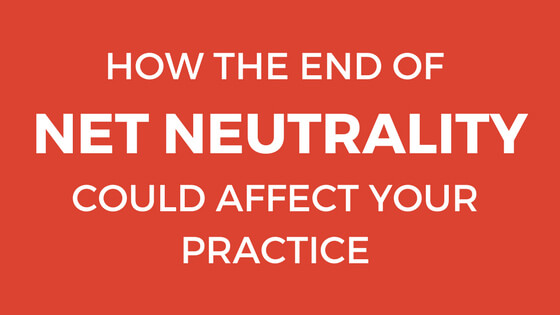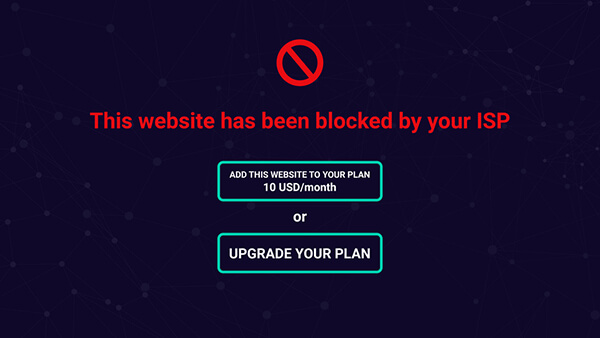Posted on January 24, 2018
How the End of Net Neutrality Could Affect Your Practice

When you open your internet browser, you expect to access any website or online service you want, at any time you want, within a reasonable amount of time, right? Of course! After all, you pay to access the internet, and it is the expectation that when you pay for a service, you are able to access that whole service. But, could that be coming to an end?
On December 14th, 2017, the Federal Communications Commission (FCC) voted to repeal the “Net Neutrality” rules set in place to protect internet consumers from Internet Service Providers (ISPs). Since then, there has been quite a buzz about how this will affect businesses (large and small) and the digital market. Net Neutrality is a complicated and sometimes vitriolic subject, but as users of the internet and a company whose business relies on the internet, it is our job to understand the information and present it to you.
If you own a business and you market that business on the internet, you need to understand the implications of Net Neutrality. This is a long one, but stick with us because it’s important. Let’s dive into the basics of Net Neutrality, and how the end of it could affect your business and ours.
WHAT IS NET NEUTRALITY?
Explanations of Net Neutrality can get convoluted, but the bottom line is this:
Net Neutrality rules were designed to make sure that anyone paying for access to the internet would be able to access any internet service or website they desire.
The basic principle of Net Neutrality is that all websites and internet services should be equal and open, as long as one has access to an internet connection. All websites load at the same speed, and there are no extra fees for accessing certain websites or internet services.
Net Neutrality rules were set in place to keep Internet Service Providers (ISPs) from nickel-and-diming your internet access. It also meant that anyone would be able to create a website or web service and it would be treated equally to more established websites in the eyes of your ISP. This meant that no companies could pay ISPs for preferential treatment.
WHAT WOULD HAPPEN WITHOUT NET NEUTRALITY?
The answer is: we can’t be completely sure. There is no way to predict how ISPs will react to the repeal of Net Neutrality rules. However, given that we know what Net Neutrality protects us against, we can come to a few possible conclusions.
The first possibility is that the ISPs do nothing. In a perfect world, large internet service companies like Comcast and AT&T would honor the principles that allow people to access the internet freely and openly. But given the long and complicated timeline of Net Neutrality, we have to prepare for the eventuality that this is not the case.
The second possibility is that the internet as we know it changes quite a bit. ISPs would no longer be required to provide unlimited and unfettered access to the internet. Without the principle of Net Neutrality, your ISP is open to:
- Charge extra fees to access certain websites and services like Facebook, Netflix, Twitter, etc. For example, you may have to pay for base internet service, and then “upgrade” your services to see your favorite websites.
- Establish a “fast lane” and “slow lane” for the speed of websites. Bigger, more lucrative companies can pay ISPs to speed up their site, while smaller companies may experience significantly slower websites. This would seriously affect web traffic, lead generation, etc.
- Block users from seeing certain websites. For example, if you are paying for Comcast’s internet services, they could block AT&T’s website because they are a competitor. There are endless scenarios in which this could pose a problem for online businesses.

HOW COULD THIS AFFECT YOUR PRACTICE OR BUSINESS?
Unless you’re willing to pay an arm and a leg to win the favor of ISPs, there is a real chance your website and internet presence will be functionally non-existent. If an ISP blocks your website, chances are the consumer will find a different one before paying to access yours. If your site is purposely slowed down because you are unable or unwilling to pay to be in the “fast lane”, consumers will leave your site for a faster one. At best, this means less web traffic, fewer leads, and less revenue. At worst, you are getting no web traffic at all.
HOW COULD THIS AFFECT GLACIAL?
Digital marketing is inherently linked to the principles of Net Neutrality. Currently, Net Neutrality rules stimulate healthy competition between businesses of all types and sizes. This creates a demand for digital marketing methods that inspire organic web traffic results. SEO, pay-per-click, content marketing, and social media marketing all fall under this umbrella.
Net Neutrality also supports the consumer-centric marketing model of providing reciprocal value for online audience’s time and attention. That means that the current internet is largely pro-consumer, with companies like Google and Facebook constantly tweaking their algorithm to provide more value to internet consumers (not the companies advertising with them.) So, when you type a question into Google, you expect to find a variety of resources and a wide range of perspectives. A non-neutral internet means that top-paying sites dominate the internet, presenting possibly devastating effects to small and medium-sized businesses (ours and yours included).
We can’t be sure of the full scope of how this will affect our industry, however, we predict that there will be a huge shift in the online market – and a big departure from the current consumer-centric marketing model.
WHAT YOU CAN DO ABOUT IT (IT’S NOT OVER JUST YET)
The FCC may have voted to repeal Net Neutrality, but the war is far from over. We can still urge our lawmakers to reverse the FCC vote, and we’re really close to getting there. We just need one more state representative on board. If you would like your voice to be heard on this subject, tell Congress what you think.
